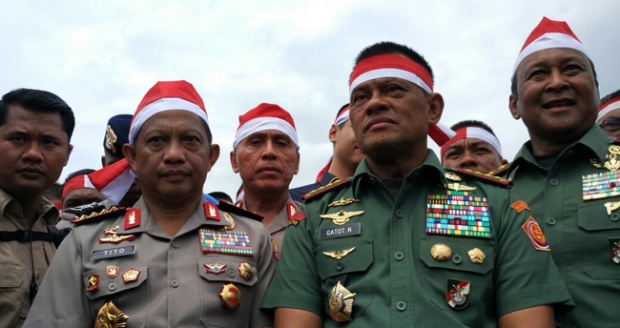Generals in Regional Elections
Translator
Editor
Kamis, 1 Januari 1970 07:00 WIB

TEMPO.CO, Jakarta - THE appearance of serving military and police officers as regional head candidates demonstrates the failure of political parties to produce leaders. Without any clear system for political recruitment, parties only sell tickets to power to anyone who wants it and has the money. As one of the primary pillars of democracy, political parties have failed to carry out their duty as institutions to select leadership candidates based on meritocracy.
As a result, transactional politics is inevitable. Those interested in running for mayor, regent and governor were forced to compete based on popularity, so that they will be considered in surveys. They have also become unexpectedly diligent in visiting party offices and mass supporter basis to garner support. All that clearly requires large funding.
Hence the political arena has become rather like soap operas in competition for viewers. Parties will choose regional head candidates based on their money and popularity. Whether the candidate is only popular because of famous parents or because of good looks does not seem important. Vision and leadership qualities are secondary-exactly like soap operas, where performance is not important as long as actors on screen are easy on the eye.
Given these facts, nominating police and military generals still in service as regional heads is an inappropriate shortcut. Their participation in regional head elections poses potential problems because their subordinates still remain (in the police and military), something that is prone to abuse.
Additionally, serving as a regional head in an area where the community is diverse clearly requires a specific set of skills in this democratic climate with its freedom of expression. Generals in the habit of leading through a non-dynamic system of command may not have that competency.
Police and military officers do of course have the same political rights as other citizens. This is already clear under the constitution. But it seems prudent to allow a break before they can participate in elections and become politicians. This is important in order to maintain the neutrality and professionalism of both the police and military.
Parties also must develop a system for recruitment and a clear career path for their cadres to fill leadership positions at the city, regency, province and national levels. Those interested must climb a political ladder that will shape, toughen and test them before they are proposed as candidates.
In a mature democracy, leaders emerge from the lower levels. They are experienced in working with the populace, solving people’s everyday problems, have an understanding of psychology and mass sociology, as well as how to be effective leaders. All these leadership competencies cannot be forced to ripen overnight based only on one’s popularity or money.
In the United States, for example, Barack Obama became president only after 10 years as a public lawyer in Chicago, 20 years as a member of the Illinois parliament, not to mention a senator. Meanwhile, his rival John McCain had a military background. But one year after he left the military in 1981, he began his political career by becoming a congressman, representing Arizona.
Indonesia’s political parties have a lot to learn from parties in countries with mature democracies. We don’t want our parties to continue to simply function as political vehicles for those seeking power.
Read the full article in this week's edition of Tempo English Magazine




















